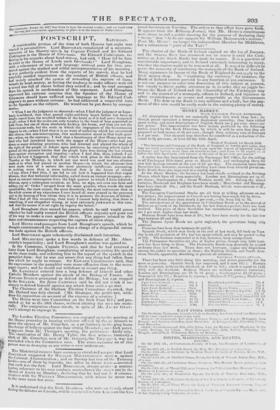POSTSCRE PT • SATURDAY.
tes e
A considerable portion of the time of both Houses last night was wasted in personalittes. Lord BROUGHAM complained of a misrepre- sentation of his Slavery speeeh by Captain Pechell and Sir Edward Codrington its the House of Conenons. Sir Edward Codrington' re- ferring to his remarks about head-moiesy, had said, " How did he dare to utter in the House of Lords such falsehoods ?" Lord Brougham, with a vehemence of tone and language unusual even for him, pro- inst the studied and wilful misrepresentation of his meaning :
tes e
to the Speaker on the subject. He would not be put down by anage-
ment-- it When I see the judgment so obscured—when I find the judgment so hope-
this silence, this non.interruption, this unobstructive mood in that high quer- ser—when, on the contrary, I find that a functionary of that House never ex- isted who bad interfered more with the usages of the House—who had put down so many debating practices, who had reversed and altered the whole of the right of the people to debate upon petitions, by exercising which right I t gained all the greatest battles that the people have won during the last twenty years against corruption and impolicy—when I find this, then, indeed, I ant led to ask how it happened, that that which took place in the debate on the Tuesday or the Monday, in which not one word was used nor one allusion i made as to what had passed in another House—in which the allusions that were made were of a nature the most absolutely indifferent, amounting to nothing more than a mere technical flaw in the forms of debate —I say, when I find this, I am led to ask how it happened that that vague allusion, that that technical informality, called down an instant stoppage—pro- duced an instant interruption from the high quarter to which I have referred ; whereas, upon a subsequent occasion, no hint, no sign, not even one faint and solitary cry of Order f' escaped from the same quarter, when words the most nacalled.for, the most unjust, the most disorderly, the most indecorous that in the whole course of my experience I ever heard of, were uttered in the presence and in the heating of him whose duty it is to preserve the decorum of debate? When I find all this occurring, then truly I cannot help feeling, that there is somethieg, if not altogether wrong, at least extremely awkward in this case, tad that the sooner it is set right by inquiry the butter."
Lord Brougham then moved for papers, which he said would prove whether he had really treated the British officers unjustly and gone out of his way to make a case against them. The papers related to the dates and circumstances respecting the capture of slave, ships.
Lord MINTO read passages from Lord Brougham's speech, which he thought countenanced the opinion that a charge of a disgraceful nature was made against the British officers.
Lord BROUGHAM again vehemently disclaimed such intention.
Lord MELBOURNE spoke a few words in defence of Mr. Aber- cromby's impartiality ; and Lord Brougham's motion was agreed to.
In the Commons, Captain PECHELL said that he had received a letter from Lord Brougham, complaining of misrepresenting his speech on the slave-trade, and referring him to the report of the speech in the pamphlet form : but he was not aware that any thing had fallen from him which he ought to retract. Sir EDWARD CODRINGTON said, that the expressions in the pamphlet were more offensive than in the news- paper report ; and he would not withdraw or retract any thirg. Mr. LANGDALE entered into a long defence of himself and other Catholic Members against the attack of the Bishop of Exeter. Sir EDWARD SUCHEN attempted to defend the Bishop' but as stopped by the SPEAKER. Sir Joust CAMPBELL said he did not tl ink it ne-
cessary to defend himself against any attack from such a rter. The Chairman of the Durham Election Committee rei orted, that Mr. Harland was duly elected. [Mr. Grainger, the petitit ner, with- drew his opposition on account of the expense of a scrutiny ]
The House went into Committee on the Irish Poor Bill ; and pro- ceeded as far as the 59th clause, without altering the Inca, ure mate- rially. The emigration clause stands, in spite of Mr. GRAT- TAN'S attempt to expunge it.


























 Previous page
Previous page